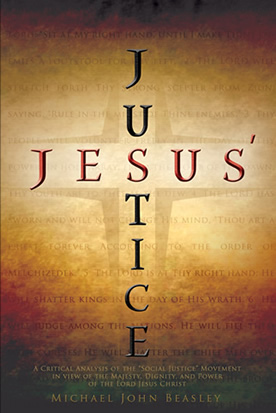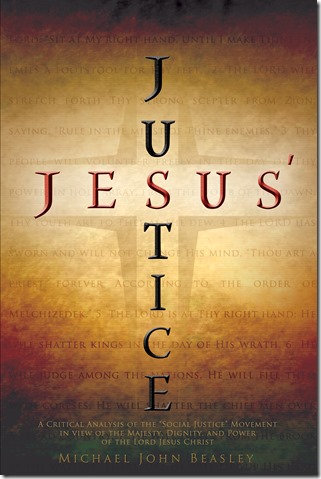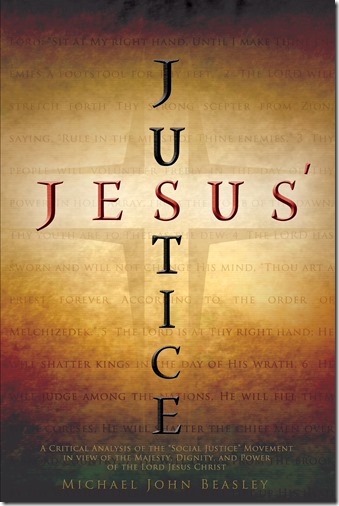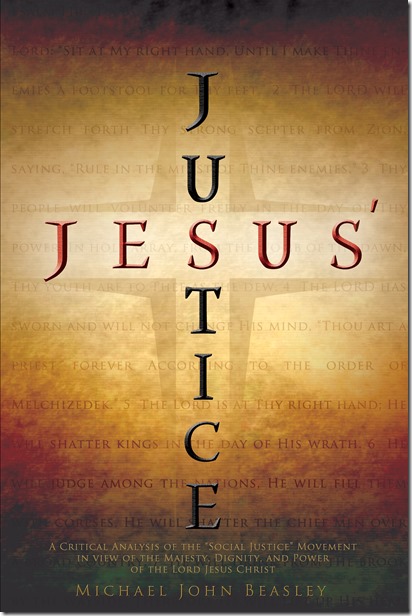The following articles have been written as a form of extended appendices for Jesus’ Justice –
Appendix V: Jesus’ Justice, Racial Bigotry, and R. L. Dabney
Appendix VI: Jesus’ Justice, OT Slavery, and the Christian’s Warfare
Appendix VII: Jesus’ Justice, R. L. Dabney, and the Bad Inheritance of Racialism
In addition to the previous, online appendices (V & VI), I would like to supply yet another example of how Dabney’s racialism led to dangerous abuses of Scripture. The substance of this article came to mind when I was made aware of a stunning conversation between Jason Farley and the hosts of the CrossPolitic podcast in which Farley asserted that credobaptism “is the cause of” the transgender identity problem which currently plagues our society. Having watched the broader context of the 27 minute “backstage” program, it was quite stunning to find that his assertions were never refuted:
Gabriel Rench: “…let’s say I’m ‘Baptist Rench.’ And, you just said what you said. You came out and said that my view of waiting until my child is ready to confess faith in our Lord, and then baptize them, is related to the identity crisis found in transgenderism.”
Jason Farley: “Yeah, I didn’t say ‘related to’ I said ‘is the cause of’ [the identity crisis found in transgenderism]”
It would appear that Rench attempted to mitigate Farley’s assertion that credobaptism is the cause of the transgender identity problem (one would hope that this is the case). Despite this, Farley re-asserted his notion of causation and then attempted to support his views. Sadly, deficiencies in parental practices exist among credobaptists and paedobaptists and those who imagine that the problem is entirely on one side of the equation are caught in a strange fantasy. Moreover, there is a profound difference between saying that poor parenting opens the door to gender confusion vs. saying that it is causative of dysphoric thinking. Frankly, there is more error in Farley’s accusations than I have the time or energy to address.
But there is an important lesson to be gleaned from Farley’s public assertions. Over the years I have sensed a greater and greater need to refute what I call controversialism: the attempt to provoke controversy without need, warrant, or pedagogical benefit. In fact, in 2018 I wrote an entire book expressing such concern (Internet Inferno). Farley’s comments to the hosts of CrossTalk were that of a controversialist and nothing more. While I can say, “I get it: this is the internet, and this has become the norm for most,” I must also confess that such a societal norm should be rejected by the people of God. Farley’s unflinching conclusion that credobaptism is causative of things like transgender ideology represents the kind of leap of logic that is destructive to the body of Christ, and history supplies us with a long line of lessons regarding this problem.

This consideration brings us to the disburbing and unfortunate example supplied by R. L. Dabney. In his presentation “Against the Ecclesiastical Equality of Negro Preachers in our Church and Their Right to Rule over White Christians,” Dabney asserted that Africans were members of an “inferior and hostile race”[1] who, because of such presumed inferiority, could never serve as leaders in the church of Jesus Christ. In an effort to support his view, he advanced two incredible and dangerous arguments: one from the OT and the other from the NT. His argument from the OT was rooted in the priestly tribe/race of Levi:
“They quote for us also, such passages as these; that in Christ ‘there is neither Greek nor Jew, circumcision nor uncircumcision, Barbarian, Scythian, bond nor free; but Christ is all in all.’ Hence, they jump to the inference, that not only the blessings of redemption, but the privileges of church office and rule, are common to all believers, irrespective of caste, class, or condition. I shall show, Sir, beyond all cavil, that there is a vast, and an unbridged chasm between this premise and this conclusion. The argument is, that because the blessings of redemption are common to all classes and races of true believers, therefore it follows, of course, that every privilege and grade of church power must be made common to them. But the answer is, that several Bible instances themselves show that this consequence does not follow. None here will dispute that the Old Testament church had a gospel; nor will any deny that its saving blessings were common to all believing Hebrews, though not to all Gentiles. But lo! the priesthood, the clerical function of the day, was expressly limited to the tribe of Levi!”[2]
In the above text, Dabney only produces a small sliver of truth when he stipulates that Colossians 3:11 does not universalize the qualifications to leadership (i.e., despite a man’s spiritual condition). In the NT, the qualifications for pastoral leadership are not unbounded, but are indeed restricted to those men who meet certain character qualifications: without which, they cannot serve as leaders (Titus 1:6-9, 1 Timothy 3:1-7). However, Dabney makes a gargantuan leap of logic when he argues that race[3] serves as a restrictive criteria for leadership within the NT church. Clearly, his mention of the OT priesthood (as comprised of the tribe/genealogy/race of Levi) finds no parallel in the NT regarding the qualifications for leadership. Such a proposition as this is utterly decimated by texts like Colossians 3:11. This is yet another example of Dabney’s exegetical habit of heralding the law of Moses over and above the Gospel, as I mention in Jesus’ Justice.[4]
Yet Dabney didn’t stop at this point, but continued his vain effort to denigrate African brethren by means of another, unrelated text. Having argued against the “ecclesiastical equality of negro preachers” on the contrived basis of the OT priesthood, he then made an even greater leap of logic based upon 1 Timothy 2:12:
“In Galatians 3:28, (a passage parallel to the one quoted against me,) St. Paul says: ‘There is neither Jew nor Greek, there is neither bond nor free; there is neither male nor female; for ye are all one in Christ Jesus.’ Blessed doctrine! Yet the same apostle says, ‘I suffer not a woman to teach;’ thus excluding from official privilege, on grounds of class, one half of the whole Christian world, which he had just declared to be ‘all one in Christ Jesus.’ So you see, gentlemen, that the apostle Paul evidently did not believe in your argument.”[5]
Remarkably, Dabney conflated his racialism with that of the scriptural roles of men and women in the church (1 Timothy 2:12-15; Titus 1:6-9, Titus 2:1-10; 1 Timothy 3:1-7). Unsurprisingly, similar arguments are found in Dabney’s Systematic Theology as well.[6] What is especially remarkable about his conflation of sex and racialism is that it yielded much confusion within a world that desperately needed scriptural clarity (much like our world today).
It is important to observe that the feminist and LGBTQ movements effectively rode the back of the black civil rights movement. Due to the advancement of feminism and gay rights, we now live in a society that denies the obvious distinctions between men and women; it denies the institution of marriage as the union of one man and one woman; and it promotes sexual licentiousness and child-grooming as normative, expected, and even protected behavior; and yet none of this has anything to do with the black civil rights movement which was a just and much needed cause. Fellow humans were being denigrated and abused simply because the color of their epidermis, and this had to be stopped immediately. However, a civil rights movement such as this has nothing to do with the gender-bending claims of feminism, the licentiousness demands of the LGBTQ community, nor does it have anything to do with the sad machinations of the “gender dysphoric” among us. Thus, it would be quite a leap of logic if I were to assert that Dabney’s conflation of racialism with that of the scriptural roles of men and women somehow caused the advancement of the feminist movement, along with its ideological sibling, the LGBTQ movement. More than a mere leap of logic, such an argument would be plainly foolish and unproductive. Those who live in defiance of God’s created order do so by means of their own volition and desire. No one else causes this but the individual.
However, Dabney’s twisted conflation of race and sex roles was certainly damaging to the church and this didn’t help society at large either. In fact, his teachings were remarkably problematic to a world that needed the kind of scriptural clarity that could destroy (καθαιρέω, kathaireo) the fortresses and speculations that were raised up against the knowledge of God (2 Corinthians 10:4-5). But in all of this, it would be quite a stretch to argue that Dabney’s teachings caused the evil that we face in the present day.
Of course, my point is not to draw a parallel between paedobaptism and Dabney’s caustic teachings of racialism. My overall point is that we ought to learn from such historical lessons, be on guard against making unscriptural leaps of logic, and forsake the temptation of becoming a “product of our times” no matter what our generation dishes out. Though it is currently fashionable to promote the racialism of Social Justice Ideology, we must resist becoming a “product of our times.” Though our world conflates gay and transgender rights with the black civil rights movement, we must resist becoming a “product of our times.” Though our culture promotes countless gender-bending ideologies and licentious conduct, we must resist becoming a “product of our times.” And though the Internet promotes the unaccountable and unproductive rants of controversialists, we must (again) resist becoming a “product of our times.” Rather than being a disciple of this world and its reasoning, may we grow as the disciples of Christ, being nurtured by His wisdom from above. And, when it comes to important discussions like race and gender, we must remember that the Gospel, and its resultant fruit (Colossians 3:11, Galatians 3:28), prohibits the people of God from making distinctions among men that are not prescribed by the Lord Himself.
[1] R. L. Dabney, Ecclesiastical Relation of Negroes: Against the Ecclesiastical Equality of Negro Preachers in our Church and Their Right to Rule over White Christians, Presented at the Synod of Virginia, Nov. 9th, 1867, p. 7.
[2] Dabney, Ecclesiastical Relation of Negroes, 11-12.
[3] By mentioning the race/tribe of Levi, the historic, denotative meaning of the word race is here preserved.
[4] “Throughout his book, Dabney consults passages from both the OT and NT, however, he leans most heavily on the Mosaic Law, to a fault, in a manner that was similar to many other pro-slavery advocates at the time. Just as the Galatian errorists infused the 1st century church with the root-rot of another Gospel (via their abuse of Mosaic law), those who promoted the continuance of 19th century slavery in America proffered similar abuses of Scripture to their generation.” Beasley, Michael John. Jesus’ Justice: A Critical Analysis of the “Social Justice” Movement in view of the Majesty, Dignity, and Power of the Lord Jesus Christ (p. 167). The Armoury Ministries. Kindle Edition.
[5] Dabney, Ecclesiastical Relation of Negroes, 11-12.
[6] Dabney’s Systematic Theology, p. 721, he stipulates the following regarding the Golden Rule: “[all are]…equal in their common humanity, and their common share in the obligations and benefits of the golden rule. All men are reciprocally bound to love their neighbors as themselves…Men have by nature, a general equality in this; not a specific one. Hence, the general equality of nature will by no means produce a literal and universal equality of civil condition; for the simple reason that the different classes of citizens have very different specific rights; and this grows out of their differences of sex, virtue, intelligence, civilization, etc., and the demands of the common welfare. Thus, if the low grade of intelligence, virtue and civilization of the African in America, disqualified him for being his own guardian, and if his own true welfare (taking the ‘general run’ of cases) and that of the community, would be plainly marred by this freedom; then the law decided correctly, that the African here has no natural right to his self–control, as to his own labour and locomotion.” Beasley, Jesus’ Justice, p. 171.




